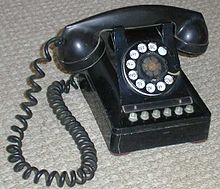
A business telephone system is a multiline telephone system typically used in business environments, encompassing systems ranging from small key telephone systems to large-scale private branch exchanges.
A business telephone system differs from an installation of several telephones with multiple central office (CO) lines in that the CO lines used are directly controllable in key telephone systems from multiple telephone stations, and that such a system often provides additional features related to call handling. Business telephone systems are often broadly classified into key telephone systems, and private branch exchanges, but many hybrid systems exist.
A key telephone system was originally distinguished from a private branch exchange (PBX) in that it did not require an operator or attendant at the switchboard to establish connections between the central office trunks and stations, or between stations. Technologically, private branch exchanges share lineage with central office telephone systems, and in larger or more complex systems, may rival a central office system in capacity and features. With a key telephone system, a station user could control the connections directly using line buttons, which indicated the status of lines with built-in lamps.